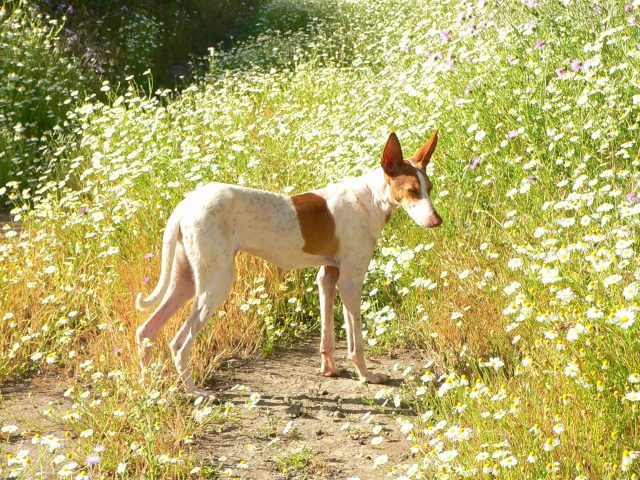Type the name of the breed you're looking for below
[wpdreams_ajaxsearchlite] Don't see the breed your're looking for? Click here and let us know!
Breed Characteristics
1 paw - breed exhibits the least amount of this characteristic
5 paws - breed exhibits most amount of this characteristic
Podenco Canario
| Other Names | Canary Islands Warren Hound, Canarian Warren Hound |
| Country of Origin | Spain |
| Weight | Approximately 55 lbs. (25 kg) |
| Height (at withers) | Males: 21.5 - 25 in. (54.5 - 63.5 cm) Females: 21 - 23.5 in. (53.5 - 59.5 cm) |
| Coat | Smooth, short and dense coat. |
| Colour | The coat should be some shade of red, white, or a combination of red and white, depending on the island and, in some cases, the specific area on some of the islands. There should be no other colour on the coat, or indeed anywhere on the body, as even the dog's nose, nails and skin should be a shade of red, and they are even known to "blush" when excited. |
| Litter Size | 3 - 6 puppies |
| Life Span | 11 - 14 years |
| Origin & History | The Podenco Canario is found on all of the Canary Islands and has long been thought to descend from a very ancient type brought to the islands in antiquity, and isolated there, presumed to be an example of the very oldest breeds. It was thought to have originated in Egypt and North Africa, and brought to the Canaries by the very earliest human settlers on the islands. Linguistic and genetic analyses of the descendants of the earliest known human inhabitants of the Canary Islands seem to indicate a common origin with the Berbers of northern Africa, who may have brought the dogs there as a food source. However, recent genetics studies have concluded that the Podenco is a type of dog more closely related to, and no more primitive than, the rest of the European hunting breeds. |
| Personality | The breed standard states that the typical behaviour is "nervy, agitated, and of an enthusiastic dynamism" a typical high-key hunting dog. Dogs of this breed that are aggressive should not be bred, but there are many others that make wonderful pets, as they are notably loyal and gentle in a way that is similar to the Greyhound. |
Care Requirements
| Health | There are no known breed-specific health concerns. |
| Grooming | This dog does not require a large amount of grooming. Their smooth short-haired coat is easy to look after. Owners will simply want to make sure the coat is brushed on a consistent basis. These dogs should only be given baths when they need it. A wipe down with a damp towel should suffice for the bathing aspect, (although you should bathe it with mild soap only if or when necessary; you should also dry shampoo it occasionally), however a rubber, wire, or hard bristled brush would work best for the brushing aspect. The shedding patterns of these dogs are not known. Be sure to check the ears carefully for signs of infection. The nails should also be trimmed, (particularly to avoid nail-born infections). |
| Exercise | This is a hunting dog that needs extensive amounts of exercise. Without it, the dog could become problematic for its owners. It should be taken on walks daily, and this dog is great for healthy people who love to jog and hike. |
| Other Considerations | While it can live in an apartment, it may perform better in a small yard. It is important for owners to make sure this dog is never unleashed in an unsecured area, as it may run off in the direction of the first interesting scent it picks up. It is important for owners to make sure these dogs are given lots of space to move around in. |



